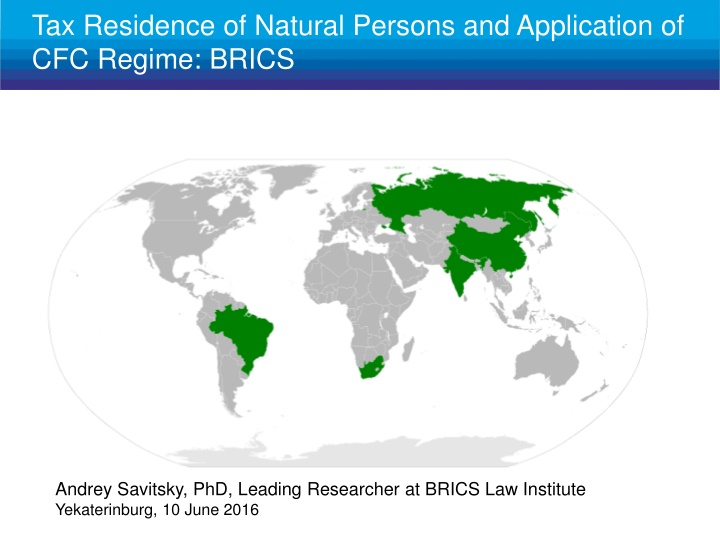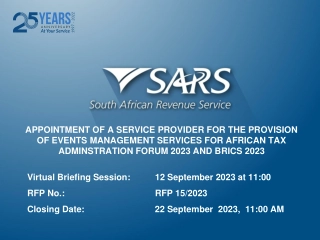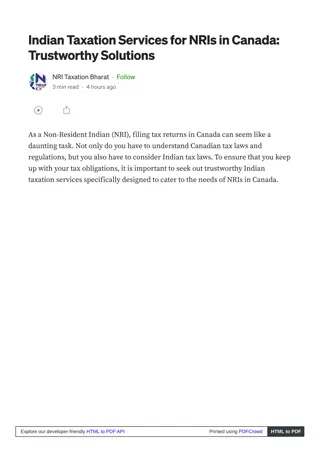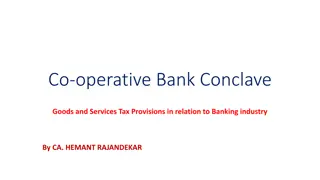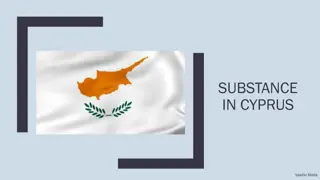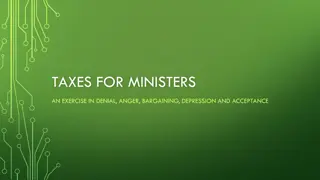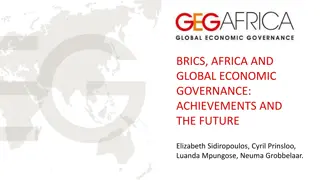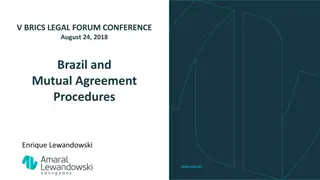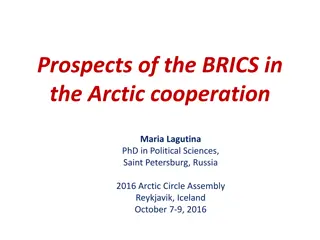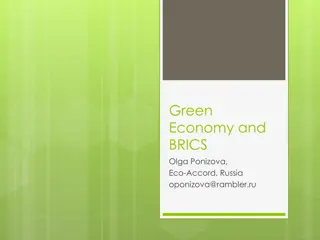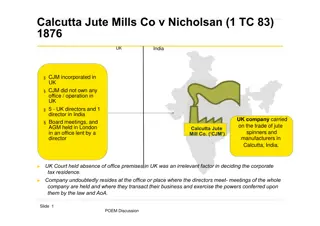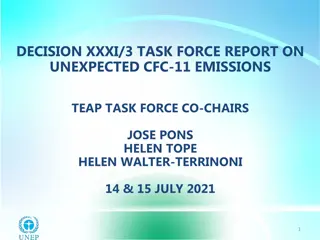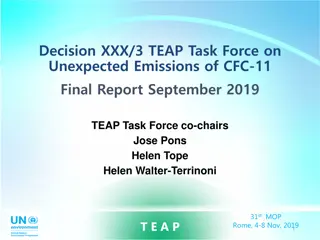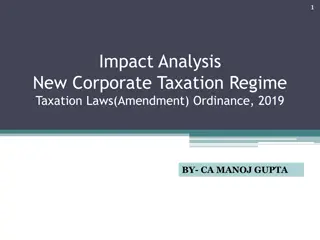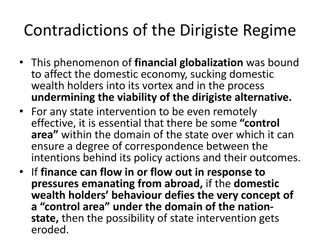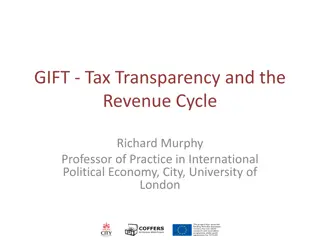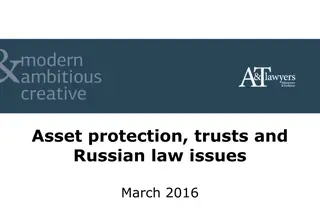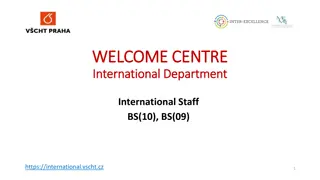Tax Residence of Natural Persons and Application of CFC Regime in BRICS Countries
Analysis of Foreign Direct Investment (FDI) flows in BRICS nations, specifically Russia, Brazil, India, and China, focusing on the application of CFC (Controlled Foreign Company) regime. The data showcases financial movements and trends among the BRICS members and their dealings with various offshore financial centers.
Download Presentation

Please find below an Image/Link to download the presentation.
The content on the website is provided AS IS for your information and personal use only. It may not be sold, licensed, or shared on other websites without obtaining consent from the author.If you encounter any issues during the download, it is possible that the publisher has removed the file from their server.
You are allowed to download the files provided on this website for personal or commercial use, subject to the condition that they are used lawfully. All files are the property of their respective owners.
The content on the website is provided AS IS for your information and personal use only. It may not be sold, licensed, or shared on other websites without obtaining consent from the author.
E N D
Presentation Transcript
Tax Residence of Natural Persons and Application of CFC Regime: BRICS Andrey Savitsky, PhD, Leading Researcher at BRICS Law Institute Yekaterinburg, 10 June 2016
BRICS Background for CFC Regime Application RUSSIA: FDI FLOWS (mln. USD) Central Bank OUTWARD FLOWS INWARD FLOWS 2013 560 100 571 2014 756 552 2 997 2015 1 073 2013 2 791 -406 404 2014 3 638 -54 1 777 2015 5 201 BAHAMAS BELIZE BERMUDA BRAZIL BVI GIBRALTAR JERSY INDIA CYPRUS CHINA LUXEMBURG CAYMAN ZAF TOTAL BAHAMAS BELIZE BERMUDA BRAZIL BVI GIBRALTAR JERSY INDIA CYPRUS CHINA LUXEMBURG CAYMAN ZAF TOTAL 2 8 -188 32 3 441 1 932 1 1 -9 0 0 62 223 206 718 411 -261 -207 9 379 -185 509 3 123 2 522 0 1 -9 -16 1 254 -717 427 -17 1 6 25 6 7 671 23 546 14 1 314 507 1 -4 409 19 965 3 907 8 266 597 11 638 3 158 1 271 -693 -7 176 571 -5 757 -79 54 11 639 789 -5 753 517 -79 6 0 2 0 0 7 671 69 219 22 031 4 839 2
BRICS Background for CFC Regime Application BRAZIL: FDI FLOWS (mln. USD) Central Bank/UNCTAD OUTWARD FLOWS INWARD FLOWS 2010 3 283 - - 445 7 303 - - 11 588 2011 7 346 -2 784 - - 162 49 - - -1 015 -2 821 2012 2010 2011 196 2012 109 NETHERLANDS SOUTH AFRICA CHINA PANAMA CARIBEAN RUSSIA BRAZIL TOTAL SOUTH AFRICA CYPRUS PANAMA BERMUDA CHINA CARIBEAN SWISS RUSSIA INDIA TOTAL 0 - - 71 0 0 173 387 480 4 340 6 547 - - 48 506 66 660 65 272 337 566 432 1 578 1 415 - - 293 175 325 1 357 5 017 - - 124 -351 - - 3
BRICS Background for CFC Regime Application INDIA: FDI FLOWS (mln. USD) Central Bank/UNCTAD OUTWARD FLOWS INWARD FLOWS 2010 552 1 514 5 098 2011 110 1 271 2 582 2012 2010 1 418 2011 1 301 2012 1 713 CYP NL MAURIT CHN SNG CARIBEAN RUS BRA TOTAL 86 NL ZAF CHN SNG BRA CARIBEAN RUS TOTAL 982 1 762 0 2 2 9 73 148 28 38 50 1 540 3 306 1 605 4 026 746 - - 18 337 11 405 10 973 2 319 761 - - 1 831 575 - - 2 11 64 5 63 46 4 1 0 14 937 23 474 18 286 4
BRICS Background for CFC Regime Application CHINA: FDI FLOWS (mln. USD) Central Bank/UNCTAD INWARD FLOWS OUTWARD FLOWS 2010 3 207 330 411 38 505 35 655 51 238 1 119 3 269 48 487 9 609 11 259 568 68 811 74 654 87 804 2011 1 265 1 420 -14 2012 1 133 2 775 -815 2010 914 929 60 567 70 500 65 561 5 428 6 097 12 946 12 277 - - - - - - 114 734 123 985 111 716 2011 761 1 139 2012 1 144 959 LUXEMBURG UK SOUTH AFRICA HONG KONG SINGAPORE INDIA BRAZL CARIBEAN RUSSIA TOTAL NETHERLANDS MAURITUS HONG KONG SINGAPORE CARIBEAN RUSSIA INDIA BRAZIL TOTAL 6 305 9 806 - - - 1 519 277 194 3 098 785 180 126 716 5
Impact of Tax Residence for CFC Regime Application 1. Determination of controlling persons (CP) scope De facto and de jure onlytax resident may be regarded as controlling person; non-resident is exempt from CFC compliance obligations (notifications, etc.). 2. Determination of CPs CFC tax obligations De jure taxresidents may be regarded as CPs in one tax year and be exempted from obligation to file tax returns and pay taxes as non-residents with regard to CFC income in another (subsequent) tax year. 6
Tax Residence of Natural Persons: BRICS BRAZIL (permanent abode, presence, citizenship) INSTRU O NORMATIVA SRF N 208, 27.09.2002 Tax Resident Status: Has permanent abode available to natural person in Brazil; Holds permanent visa (entrance); Holds temporary visa (entrance/184-day); Brazilian citizen lost resident status and returned to Brazil on permanent basis (return); Person leaves Brazil and does not file the proper declarations with tax authorities. 7
Tax Residence of Natural Persons: BRICS RUSSIA (physical presence, state service) Personal Income Tax (Ch. 23 of the Tax Code) Tax Resident Status: Permanent physical presence at least 183 days in 12 consecutive months. The term will not be intercepted for: Short-period (less 6 months) leave for education or treatment; Employment at offshore hydrocarbon feedstock; Russian servicemen and state and municipal officers seconded abroad. 8
Tax Residence of Natural Persons: BRICS INDIA (physical presence) Income Tax Act (1962) Tax resident (and ordinary resident): is in India for an aggregate period of 182 days or more during the previous year; during the 4 years preceding the previous year, remained in India for an aggregate period of 365 days or more and is in India in that previous year for 60 days or more; Resident (not ordinary resident): has been a non-resident in India in 9 out of 10 years preceding the previous year; has not during the 7 years preceding the previous year been in India for a total period of 730 days or more. 9
Tax Residence of Natural Persons: BRICS CHINA (domicile, physical presence, source) Individual Income Tax Law Tax Resident Status: Domicile in China; Residence (physical presence) in China for a full year; Derives income from Chinese sources. Domicileis defined as habitually residing based on the basis of household registration, family or economic interests. Residence (physical presence) - stay in China for 365 days in a tax year. Temporary absence (30/90) and absence for education, employment, work, family visit or tourism with obligation to return does not affect computation of the period of stay. 10
Tax Residence of Natural Persons: BRICS SOUTH AFRICA (physical presence, domicile) Income Tax Act (1962) Tax resident: ordinarily resident in South Africa; or physically present in South Africa for more than 91 days in the current tax year; physically present for an aggregate of more than 915 days in the preceding 5 tax years and physically present for more than 91 days in each of those preceding 5 tax years Ordinary resident: the place to which the person would naturally return from his travels and which is his real home. Case-by-case basis 11
Tax Residence of Natural Persons: Challenges for BRICS CFC Regimes Collision of national residence criterions for BRICS natural persons; Avoidance of Tax Resident Status; 12
Collision of Tax Residence for Natural Persons: BRICS Collision of national residence criterions for BRICS natural persons: Domicile vs. Physical presence; Permanent abode vs. Domicile; Physical presence vs. Physical presence (different terms); Citizenship vs. Physical presence, etc Application of tie breaker rule (Art. 4(2)): Mutual agreement procedure; MAP failure non-resident in both states (RUS CHN) 13
Collision of Tax Residence for Natural Persons: BRICS Application of BRICS DTCs Tie breaker rule (Art. 4(2)): a) (1) permanent home available (PH); (2) centre of vital interests; b) habitual abode (HA); c) national (N); d) mutual agreement (MAP); (if MAP fails non-resident of the both Contracting States see RUS CHN DTC 2014) 14
Collision of Tax Residence for Natural Persons: BRICS BRICS DTC Tie breaker rule (Art. 4(2)): BRA RUS IND CHN ZAF (a) (1) PH - (2) CVI; (b) HA; (c) N; (d) MAP (a) (1) PH - (2) CVI; (b) HA; (c) N; (d) MAP (a) (1) PH - (2) CVI; (b) HA; (c) N; (d) MAP (a) (1) PH - (2) CVI; (b) HA; (c) N; (d) (1) MAP - (2) Non-resident (a) (1) PH - (2) CVI; (b) HA; (c) N; (d) MAP (a) (1) PH - (2) CVI; (b) HA; (c) N; (d) MAP - BRA (a) (1) PH - (2) CVI; (b) HA; (c) N; (d) MAP (a) (1) PH - (2) CVI; (b) HA; (c) N; (d) MAP (a) (1) D - (2) CVI; (b) HA; (c) N; (d) MAP - RUS (a) (1) PH - (2) CVI; (b) HA; (c) N; (d) MAP (a) (1) PH - (2) CVI; (b) HA; (c) N; (d) MAP (a) (1) PH - (2) CVI; (b) HA; (c) N; (d) (1) MAP - (2) Non-resident (a) (1) D - (2) CVI; (b) HA; (c) N; (d) MAP (a) (1) PH - (2) CVI; (b) HA; (c) N; (d) MAP - IND (a) (1) PH - (2) CVI; (b) HA; (c) N; (d) MAP (a) (1) PH - (2) CVI; (b) HA; (c) N; (d) MAP (a) (1) PH - (2) CVI; (b) HA; (c) N; (d) MAP - CHN (a) (1) PH - (2) CVI; (b) HA; (c) N; (d) MAP (a) (1) PH - (2) CVI; (b) HA; (c) N; (d) MAP (a) (1) PH - (2) CVI; (b) HA; (c) N; (d) MAP - ZAF 15
Artificial Transfer of Tax Residence BRAZIL: Anti-abusive Measures Currently, as per Law 12,249/2010, the transfer of the tax residence of a former Brazilian resident to a country or jurisdiction considered a low-tax jurisdiction or as granting privileged tax regimes, only becomes effective after the individual evidences that: he/she resides, in fact, in such country or jurisdiction. Such evidence is made via (i) the proof that the individual remained in such country or jurisdiction for over 183 days, consecutive or not, in a 12-month period or (ii) proves that his/her habitual dwelling and the majority of his/her wealth is located in such country or jurisdiction; or he/she is subject, in such country or jurisdiction, to tax in connection with the totality of his/her earnings and capital gains, substantiating this circumstance with documentation evidencing the payment of the tax. 5
CFC Regime in BRICS: the Way Ahead Exchange of best practice; Common approaches to combat artificial transfer of tax residence; Enhanced exchange of tax information; Effective assistance in collection of taxes; Multilateral instruments 17
Obrigado pela sua ateno! ! ! Ngiyabonga ukulalela kwenu! . 18
